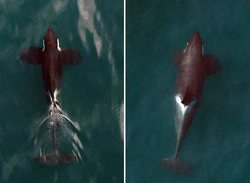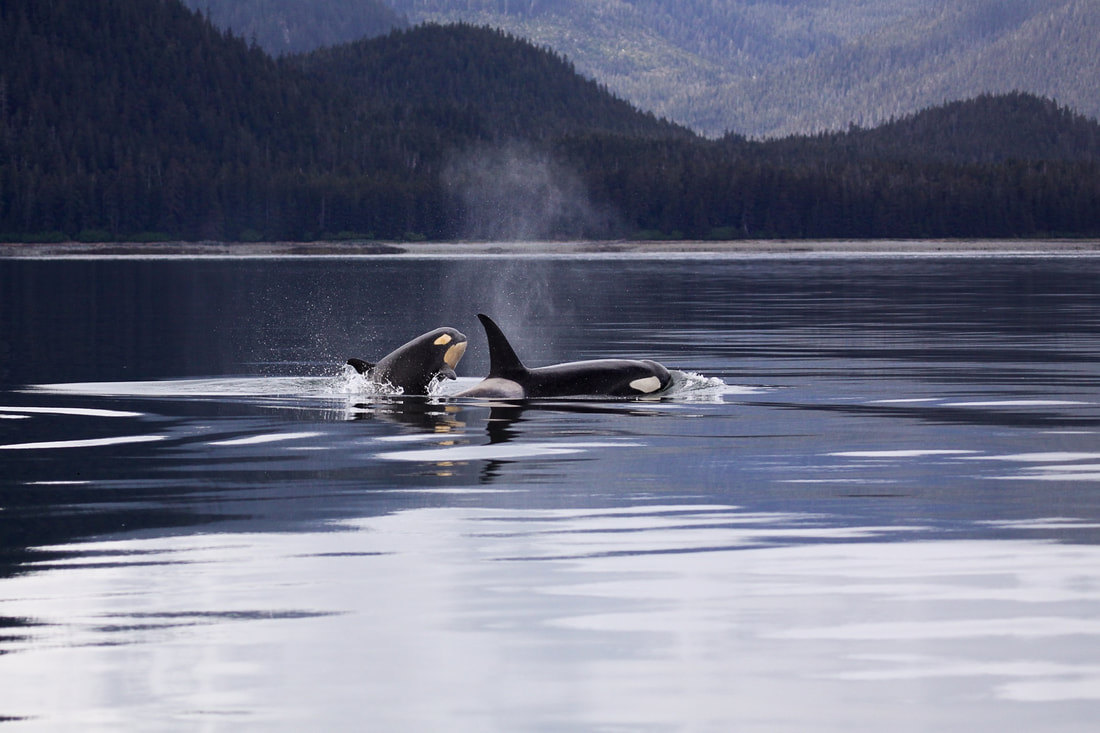|
There was once a golden time not that long ago when families gathered each summer to spend time camping in Johnstone Straight, British Columbia in the northern reaches of the Salish Sea. We pitched our tents on shore and had a big common kitchen where we took turns cooking and just hanging out together under a large tarp, which shielded us from scattered showers. Our days were spent exploring, fishing, clamming and making art projects, like a seaworthy craft fashioned out of driftwood. But our evenings were spent on board a boat we had anchored in the bay, making music with orcas. The orcas had complete freedom to come and interact or not. It turns out that orcas are accomplished and motivated acoustic creatures and we found them to be willing participants in our jam sessions. Our leader, Jim Nollman, of interspecies.com had a hydrophone and an underwater microphone that we lowered into the water so the whales could hear what we were playing and their vocalizations were audible to us through a speaker on deck. What we learned was surprising, but it also made sense. It was not our best performance that got the most powerful response, but rather those times when we dropped from our heads to our hearts and got "into the groove." Nollman founded Interspecies to empower artists to re-invent the human relationship with animals, with the goal of healing our own species' emotional, spiritual, and cultural ties with nature. That is important work since nature is mother to everything! There was a particular orca mother, A30, and her enthusiastic virtuoso son, A6, who visited us often. Listen to the recording below for a sample of one of our sessions.
Fast forward the present and a review of the state of Resident Orca populations in the Salish Sea. Both Northern and Southern Resident Orcas are imperilled. There were 7 deaths in 2017 which brings the population to a 30 year low, with only 76 individuals. The Resident Orcas (as opposed to Transients) stay in the same habitat all their life and eat only one food, wild salmon. The reason for their demise is a combination of pollution, habitat loss and especially the fact that humans overlooked the need for fish ladders in the dams we built. The local salmon spawning routes to their natal streams are gone. There is simply not enough food for these majestic animals. It is especially heartbreaking that the orcas I came to know, the orcas we jammed with playing music, are now dead. One particular orca, A6, the best orca singer we ever came across, only lived to be 35 years old. This is half of a normal life expectancy since orcas have a similar life span to ours.  The photo on the left shows a starving orca who died soon after the photo was taken. You can tell it is starving because of the hollows behind his skull just above the white patches. For comparison, an image of a well fed orca is shown on the right. Environmental sensibilities are outraged that "dominion is given to humans over all the Earth." Outrage or not, it's easy to see that's true. Human beings make the decisions, informed or not, for vast tracts of land, ocean and atmosphere as we have wrested control over nature in countless ways. It is also painfully apparent, we are making a mess of it.
0 Comments
Leave a Reply. |
AuthorMy passion is my bond with animals and love and appreciation for our home, Earth. I make cast glass sculpture and nature is my muse. Archives
August 2020
Categories |
||||||

 RSS Feed
RSS Feed